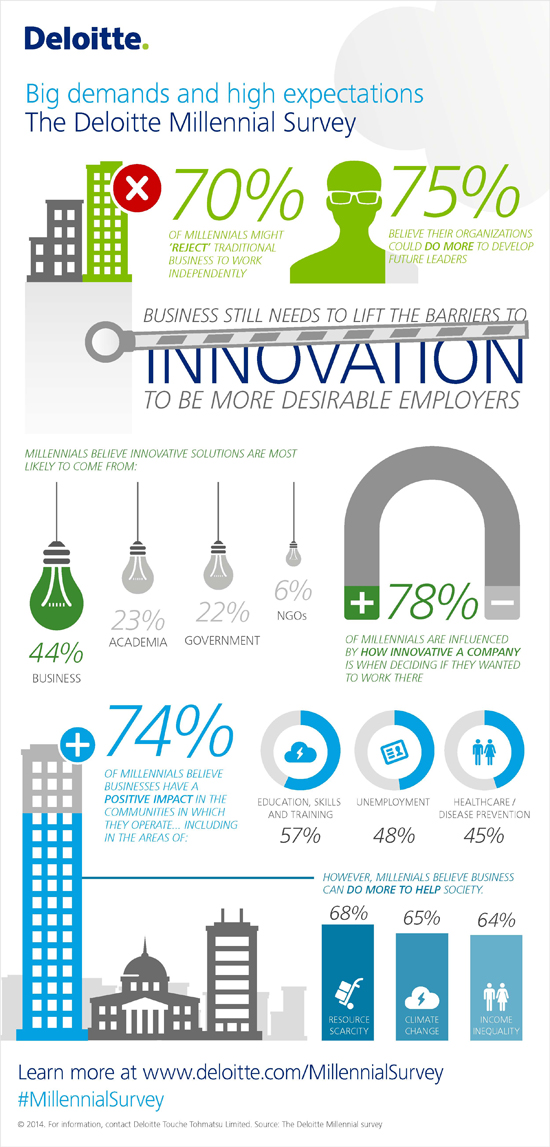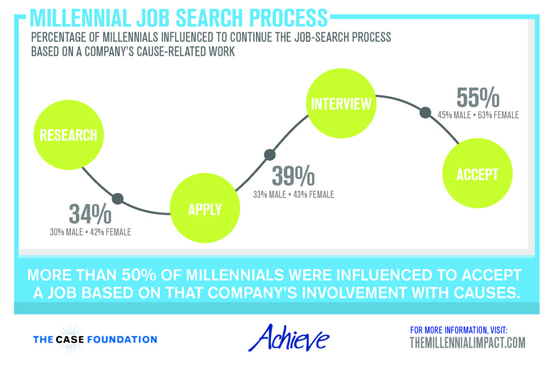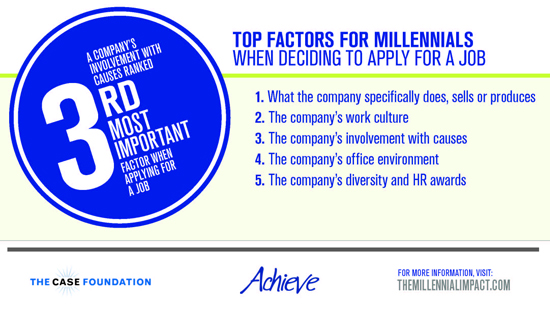There’s no doubt hiring Millennials has become a big part of your recruiting efforts. This age group—roughly those under 35 years of age—is set to comprise 75 percent of the global workforce by 2025, according to BPW Foundation. Whether that impact of Millennials on your workforce is positive or negative, though, is a matter of perception and how well your company and its culture embraces, fights against or even understands this generational evolution. For the next couple minutes, put aside your old biases and take a look at this most recent research to get a better grasp of this shift and how it affects hiring and retention.
First, let’s take a look at some big-picture research. The 2014 Deloitte Millennial Survey confirms what we’ve been learning about this generation for the past several years: They value innovation, cause-related work and professional development opportunities over all else. Here’s a quick overview:

Breaking down the topic of innovation, 78 percent of Millennials are influenced by how innovative a company is when deciding if they want to work there, but most say their current employer does not greatly encourage them to think creatively. The biggest barriers to innovation? Millennials believe the culprits are management attitude (63 percent), operational structures and procedures (61 percent), and employee skills, attitudes and a lack of diversity (39 percent).
When it comes to professional development, the Deloitte study shows an overwhelming 75 percent of Millennials believe their organizations could do more to develop future leaders. The 2014 Millennial Impact Report sponsored by The Case Foundation supports this finding. According to that study, Millennials are more likely to stay at a company when they perceive their talents and passions being used and fulfilled. In fact, more than half (53 percent) of respondents said having their passions and talents recognized and addressed is their top reason for remaining at a current job.
Now for perhaps one of the most talked about and mystifying aspects of hiring Millennials: appealing to the “do-gooders.” Concepts like “cause-driven work” and “social good” have been used to describe the altruistic motivations of many Millennials. The Deloitte study supports this, finding that most are eager to make a difference and believe the success of a business should be measured in terms of more than just its financial performance–but with a focus on improving society.
However, before making community service the biggest bullet in your job listings, The Case Foundation’s study dives deeper, providing a fascinating insight: A company’s cause work begins to influence most Millennial employees only after the interview. While 39 percent of Millennials researched their company’s cause work prior to their interview, 55 percent of Millennials were influenced to take their current job after discussing cause work in the interview. What’s more, female Millennial employees were more interested than males in cause work, from the start of a job search to the decision to accept a job offer. Even then, the study concludes the majority of Millennial employees said that a company’s involvement with cause work and community initiatives did not factor into the search that resulted in a current job.
“A company’s cause work will not influence a Millennial accepting a job offer,” explains Juan Tornoe, CMO and partner at Austin, TX, marketing communications firm Cultural Strategies Inc. “It will most certainly enhance their experience working for that company, if it is being done wholeheartedly and for all the right reasons. If you are authentically and transparently supporting a cause, that will significantly contribute to the retention and satisfaction of your Millennial staffers.”
Here’s how this point plays out graphically:

To further reassure you that Millennials are far less idealistic when job searching than you might assume, The Case Foundation study found that what a company does, sells or produces, coupled with pay and benefits, were far greater concerns than what a company can do for the greater good. Here’s proof:

One key takeaway in comparing these two studies is how and when these factors play a role in recruiting and retention. As you can see, the importance can change throughout the process. Additionally, it’s important to understand how these studies are worded. For instance, you may recall from the Deloitte infographic that 70 percent of Millennials admit they would reject traditional business to work independently. Does that mean your workforce is destined to be a revolving door of commitment-phobic freelancers and anti-social telecommuters? Not necessarily. A better way to look at the situation is to remember what Millennials consider the biggest barriers to innovation: Management attitude, operational structures and procedures, and employee skills, attitudes and a lack of diversity.
“For Millennials, one of the most negatively charged phrases utilized at the workplace is, ‘We’ve always done it this way,’” says Tornoe. “If this is what your Millennial staff members are constantly hearing when questioning a procedure or suggesting a new way to do a certain thing, they’ll think, ‘So, who, doing what, got us into the mess we’re facing right now?’ We must be willing, for the long-term sustainability of our businesses, to explore new ways of getting the job done and not immediately shoot down any innovation attempt.”
Being open to reimaging these areas of the business can be the key to quelling the perception of a “traditional” business that is bent on keeping things the way they’ve always been, whether it still makes sense or not.
What insights have you gained as you dive deeper into hiring the soon-to-be largest generation in the workforce?
Main Image Copyright: massonforstock / 123RF Stock Photo
Infographic 1: 2014 Deloitte Millennial Survey
Inforgraphics 2 & 3: The 2014 Millennial Impact Report



